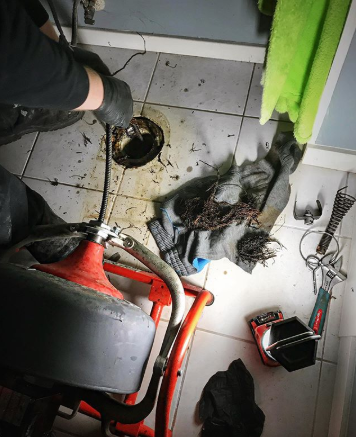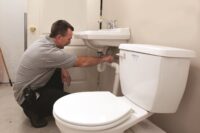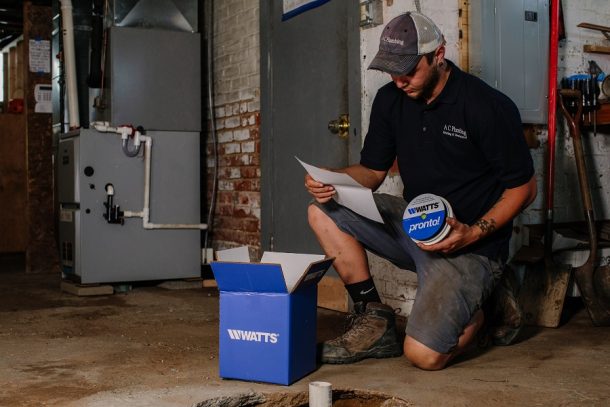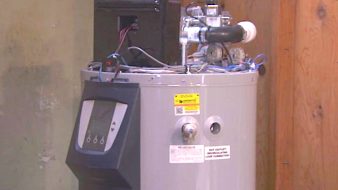DIYers are often resourceful when it comes to caring for their homes, but some home repair tasks require professional expertise to complete safely and correctly. Even what is thought to be simple plumbing jobs have the potential to turn into major, costly repairs if done incorrectly, so it’s best you hand off any, and all Read more
Whats New

DIYers are often resourceful when it comes to caring for their homes, but some home repair tasks require professional expertise to complete safely and correctly. Even what is thought to be simple plumbing jobs have the potential to turn into major, costly repairs if done incorrectly, so it’s best you hand off any, and all plumbing needs to a licensed plumber who has the training and experience necessary for successful execution. Here are some of the more common plumbing tasks homeowners should avoid doing themselves.
1. Water Heater Repair or Replacement
Water heaters are complex machines, and attempting to repair one yourself can be dangerous. If your water heater is malfunctioning, calling a professional to safely diagnose the issue and recommend the appropriate course of action is best. The same goes for water heater replacement; be sure to leave it to the professionals to ensure a safe and successful installation. You must also know local building codes, as some require a licensed professional to install a water heater. The potential fines for noncompliance could easily outweigh the cost of a professional installation.
 2. Sewer Line Repair
2. Sewer Line Repair
Your home’s sewer line is responsible for safely transporting wastewater to the municipal sewer system, so any repairs or maintenance should be left to a licensed plumber. The job is often labor-intensive and can involve digging up your lawn, so it’s best to leave this task to the pros who have experience safely and correctly handling such a complex job.
Inspecting your drain lines, toilets, and other plumbing fixtures, you can look for signs of a sewer line issue. If you notice any backup or clogs, it’s time to call in a plumber. Other common signs of a sewer line issue include gurgling sounds from the drains, water pooling in the yard, and foul odors.
3. Roof Leaks
Roof leaks can cause significant damage to your home’s interior and be time-consuming to locate and fix. While small roof leaks may seem like a do-it-yourself job, leaving this one to the pros with the expertise and tools necessary for successful waterproofing is best. A roof plumber Sydney will be able to identify any other potential causes for the leak, such as a faulty gutter or loose shingles. The cost of a professional roof inspection is typically much less than the cost of repairing water damage caused by an undetected leak.
4. Gas Line Installation and Repair
Imagine trying to fix your gas line only to end up making a mistake and causing an explosion. This is why all gas line repair and installation needs should be handled by a licensed plumber who understands the risks associated with such a job. Gas lines can become damaged over time due to corrosion or may need to be installed when building a new home. Attempting either of these tasks yourself could have potentially dangerous consequences; leaving gas line repair and installation to the professionals is best.
5. Dewatering
After a heavy downpour or a burst pipe, water can seep into your home and cause damage to the structure. A professional plumber has the tools and experience necessary to efficiently remove all standing water from the area and assess any damage that may have occurred.
This is an essential step in the repair process, as it helps prevent mold growth which can cause serious health issues for your family. A professional plumber can also advise on the best waterproofing solution for your home.
Regardless of your plumbing task, it’s important to remember that some jobs are too complex to tackle alone. If you feel ill-equipped or need help with how to proceed, it’s always best to call in a professional who can help ensure your safety and the project’s success. The cost of hiring a professional is often much less than the potential fines or damage you could incur by attempting the job yourself. You’ll have peace of mind knowing that the job was done right.

If you’re having problems with your water heater, you’re not alone. Here are seven common water heater problems and how to fix them using a professional service. Not Enough Hot Water Your water heater might start having issues with temperature control. The most common problem is when the water isn’t hot enough. In such cases Read more
If you’re having problems with your water heater, you’re not alone. Here are seven common water heater problems and how to fix them using a professional service.
Not Enough Hot Water
Your water heater might start having issues with temperature control. The most common problem is when the water isn’t hot enough. In such cases, the first thing to check is the thermostat. Make sure it’s set to the correct temperature. If the issue persists, it may be time to contact professional water heater repair services.
 Leaking Water Heater
Leaking Water Heater
Although leaks are common, they also indicate a significant issue with the water heating system. Leaks usually indicate loose plumbing connections or a corroded water line, and it’s advised to turn off the power supply and call a plumber. Here are the most common causes of water leaks:
- Overheating,
- A bad gasket,
- Problems with the water tank,
- A stuck valve,
- Trouble with water pressure, etc.
Noisy Water Heater
Sometimes you might notice that the water heater is making peculiar noises. The primary reason behind this can be sediment build-up. The first thing you should do is try cleaning the sediment yourself and flush the water heater. If the problem persists, the sediment build-up might be too much, and it’s best to contact a water heater repair company.
The Water Heater Won’t Turn On
Next is when your water heater is simply not turning on. If that’s the case, check the circuit breaker and see if it’s tripped. In that case, flip it back on and then try again. If the issue persists, there could be a problem with the thermostat.
Discoloration
If you notice rusty water coming out of the tank, it may indicate corrosion, which means it needs a cleaning service.
Low Pressure
A drop in water pressure is another indication of a water heater problem. This might be because of hard water build-up in the tank, sediment accumulation, or blocked filters.
Malfunctioning Pilot Light
One common issue when servicing gas-powered tank heaters is a malfunctioning pilot light or burner. If the pilot light fails to turn on, contact your local gas utility company for servicing. Otherwise, the potential problem could be a defective thermocouple, clogged vent, burned-out orifices on the burners, or improper temperature control. Checking each element and adjusting the temperature when running hot water can help diagnose the root cause of these specific issues.
How To Fix A Water Heater?
Once you have identified the problem, you can begin to fix it.
For example, if the problem is with the pressure-relief valve, you can simply clean it. If the problem is with the heating element, you can replace it.
If you are unsure how to fix the problem, call a professional. Issues with water heating systems require technical expertise, and qualified professionals know how to fix them. Additionally, they are experts in replacing water heaters and have the tools to install them successfully. Most parts that they provide have long-term warranties.
Tips For Preventing Water Heater Problems
Once you have taken care of the persisting issues with the water heater, taking a few precautions is essential. Here are a few tips that you should keep in mind.
- Ensure that there is no sediment build-up in the tank.
- Always invest in a water heater according to the requirements. A small water heater shouldn’t serve a large family and may soon start causing trouble.
- It’s good to call a professional for regular water heater inspections and maintenance.
How To Choose The Right Water Heater?
You need to consider a few things when choosing a water heater.
- The first is how much water you need to heat. If you extensively use the water heater or you often have guests over, you’ll need a larger water heater.
- The second thing to consider is the type of water heater: electric or gas. Electric water heaters are cheaper to install, but gas water heaters are more efficient.
- The third thing to consider is the climate. A water heater is a must if you live in a cold climate.
Final Words
Following these tips, you should be able to troubleshoot and fix most water heater problems. If you’re still having issues or if your water heater is beyond repair, be sure to contact a professional.

When you’re running a plumbing business, you will always face challenges managing your company and ensuring that you deliver the best service to your clients. Once you are aware of these challenges you will know the best ways to handle them. Here are some key examples that you should keep in mind. Avoiding Disruption First Read more
When you’re running a plumbing business, you will always face challenges managing your company and ensuring that you deliver the best service to your clients. Once you are aware of these challenges you will know the best ways to handle them. Here are some key examples that you should keep in mind.
Avoiding Disruption
First, you need to make sure that you are taking steps to avoid disruption in your business model. Significant levels of disruption are an issue, particularly if you are working for commercial clients. For instance, you might need to provide your client with an underground tank replacement at an operating business property. To avoid disruption, it’s important to make sure that you can be flexible to client needs. To steps to work around their schedule. This is one of the best ways to earn a positive review or a referral. We’ll discuss this further down.

Maintaining Trust
Whenever clients use a plumbing service, they want to hire a company they can trust. They will always be weary about whether they are protected financially and if there are any hidden risks of using your solution. You need to take steps to put their minds at ease. One of the ways that you can do this is by offering both guarantees and warranties on your services. You should also provide various contact points that customers can use if they do ever have an issue.
Earning Positive Reviews
Next, you should aim to gain positive reviews for your plumbing business. Without the right positive reviews, you are going to struggle to build up your client base. You might find that new clients will not provide your company with the chance it needs. This can be troublesome if you are just getting started in the plumbing industry and you don’t yet have a loyal base of customers. To earn positive reviews, you need to put a strong focus on customer care and client satisfaction. You should also remember to ask for reviews and feedback. Even a few mixed reviews create a more positive impression than zero reviews connected to a new business brand.
Hiring The Right People
Finally, you need to make sure that you are hiring the right people in your plumbing business. A lot of plumbing companies these days are choosing to use the services of freelancers. While they may help cut costs, freelancers can cause issues because they are not as loyal to a company they’re working for. They can simply move onto the next project or company that hires them. You will also struggle to build up a significant relationship with freelancers. As such, it might be best to instead use a recruitment agency and hire the best permanent workforce with the right skills, qualifications, and experience.
We hope this helps you understand some of the key challenges that you can encounter when you are running a plumbing business and the steps that you should take. In doing so, you can beat your competitors and keep your profit levels healthy.

Owning a plumbing business is great, but are you working at the efficiency that you want to be working at? If the answer is no, then you need to do whatever you can to improve this as soon as possible. If you’re not sure where to begin with this, then it’s a good thing that Read more
Owning a plumbing business is great, but are you working at the efficiency that you want to be working at? If the answer is no, then you need to do whatever you can to improve this as soon as possible. If you’re not sure where to begin with this, then it’s a good thing that you have come across this article as we’ve got some advice for you. Keep reading down below if you would like to find out more about what these things are.

Make Use Of Available Software
First, you want to make sure that you are making use of all of the available software. Some of it you are going to have to pay and some of it is available for free, but it’s all going to be worth it. For example, things like a workforce manager are going to make your life so much easier as you can set schedules and tasks all in one place that everyone can see. Then you have other pieces of software such as accounting software so that all of your accounting information is available in one place etc.
It might not seem like a massive lifesaver now, but we promise you that investing in the correct software is going to make your business life so much easier, and take your efficiency to whole new levels.
Improve Communication In The Business
If you work for yourself, then this isn’t going to be a huge issue, but if you own a plumbing business then communication is key. You need to know where people are, what they are doing, and you need to keep track of everything. Everyone in the business needs to communicate effectively so that everything can be kept on the right track and updated if necessary. You can create group chats on certain platforms to allow everyone to talk to each other, ensuring that everyone is kept in the loop, and can amend anything as needed.
Continue To Send Employees On Training Courses
Finally, if you are wanting to improve the efficiency within your company then you will need to ensure all employees are trained to the highest quality. Without this, you will just be the same as any other company that is similar to yours. To stand out, you must sign your staff up for CPD courses. This not only provides them with the necessary skills to be a part of your business but gives them reassurance you care about their career. If you are wanting to save money while training your staff then look into buying courses in bulk. Training all your employees at once means you won’t have to keep booking staff off for training days.
We hope that you have found this article helpful, and now see some of the things that you can do to improve your efficiency and bring your plumbing business more success. It’s a lot easier than you probably think it is, it’s just going to require you to dedicate yourself a little more in certain areas. We wish you the very best of luck, and hope that this yields positive results for you soon.

Underfloor heating can come in two forms: water/wet or electric/dry underfloor heating. For water underfloor heating, water pipes are linked to a manifold and the boiler. Electrical wires are installed beneath the floor surface but over the floor insulation in electric underfloor heating. While underfloor heating might seem like an additional expense, it can be Read more
Underfloor heating can come in two forms: water/wet or electric/dry underfloor heating. For water underfloor heating, water pipes are linked to a manifold and the boiler. Electrical wires are installed beneath the floor surface but over the floor insulation in electric underfloor heating. While underfloor heating might seem like an additional expense, it can be valuable and rewarding. This article outlines five reasons to invest in underfloor heating.

1. Even heat distribution
Radiator systems usually concentrate on heating a specific spot first before spreading across an entire room, making it highly inefficient. Also, there’s a risk of heating escaping through the ceiling. Nonetheless, investing in underfloor heating ensures heat is evenly distributed across a room, creating a warm, comfortable environment with maximum energy efficiency. It also makes your floors dry and warm, enabling you to walk around comfortably in cozy slippers or barefoot without experiencing a chill. You can click here to learn more about underfloor heating systems and the various options available for your home.
2. Design freedom and more space
Underfloor heating systems allow you to design your dream home without worrying about huge radiators consuming valuable wall space and causing significant obstruction, mainly when cleaning around and decorating. Even the latest radiators take up a lot of space, robbing you of design freedom. Luckily, underfloor heating lets you enjoy the freedom of designing and laying out your house. It also allows you to select the floor covering you like because it works well with all of them, including wood, stone, vinyl, laminate, carpet, tile, and others.
3. Energy-efficient heating
To heat a room effectively, traditional radiators should be heated to specific high temperatures. Also, they don’t distribute heat evenly. They warm the spots close to them first, then the rest as time passes, which results in high energy bills. Underfloor heating heats a room from the beneath the floor going up, providing efficient, consistent warmth. Water underfloor heating involves pumping gently heated water via pipes for a comfortable temperature.
Electric underfloor heating involves installing electric cables underneath the floor to generate heat. Underfloor heating requires minimal running temperature, consuming less energy and keeping your energy bills down. Additionally, underfloor heating systems attain your desired temperature with a system-specific thermostat, efficiently warming your home to help you relax.
4. Easy to run
Once installed, underfloor heating requires close to zero maintenance, and vendors offer extensive warranties for your products, giving you peace of mind. Electric heating systems don’t require frequent servicing. However, wet underfloor heating solutions may need occasional assessment to ensure proper functioning. Underfloor heating with system-dedicated thermostats enhances the system’s energy efficiency, and automatic heat features or programmable heat plans keep you from thinking about your space’s heating. This is because they heat your house at the right time and temperature.
5. Safety and comfort
With underfloor heating, you don’t have to worry about a radiator’s hot surfaces and sharp edges when kids are at home because the systems are safely tucked away. The radiant heat from underfloor heating is great for your house’s air quality because it maintains the air oxygen-rich and fresh.
Endnote
Underfloor heating systems are a worthy investment for every homeowner. Consider investing in underfloor heating to enjoy these benefits. benefits.

 Leaking Water Heater
Leaking Water Heater